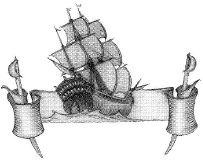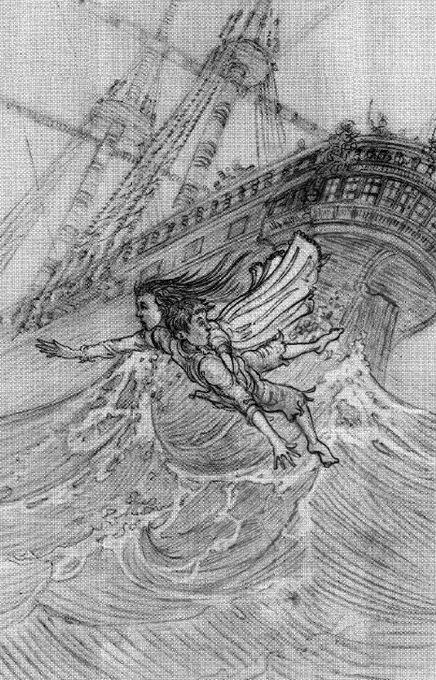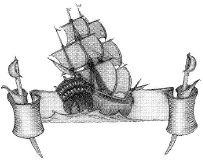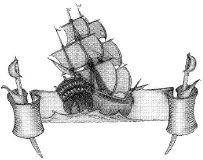Peter and the Starcatchers (22 page)
Read Peter and the Starcatchers Online
Authors: Dave Barry,Ridley Pearson
Tags: #Juvenile Fiction, #Fiction, #General, #Family, #Social Science, #Fantasy, #Action & Adventure, #Magic, #Friendship, #Pirates, #Juvenile Nonfiction, #Orphans, #Nature & the Natural World, #Humorous Stories, #Orphans & Foster Homes, #Adventure and Adventurers, #Islands, #Folklore & Mythology, #Characters in Literature

“Take Mr. Slank as wel ,” he shouted. He had noticed how eager Slank had been to protect the trunk. As he was shoved toward the
Jolly Roger,
Slank gave Stache a cool look, and then glanced into the water, where the trunk had gone over.
He knows something about the trunk,
thought Stache.
And I aim to find out what it is.
Stache had not given up on the treasure, not at al ; in fact, now that he’d had it in his hands, he was more determined than ever to have it. The trunk was made of wood, and it was clearly not heavy; the boy had lifted it easily. It would float. It was in the sea, somewhere, nearby. The storm would pass. And Stache would find it.
“And the others, Cap’n?” shouted Smee, pointing to the rest of the
Never Land’
s crew and passengers—a wretched, drenched lot of bedraggled sailors and smal boys. Some were screaming, begging to be taken aboard the
Jolly Roger,
having decided it was better to be prisoner on a ship ful of vicious pirates than to be left aboard the
Never Land.
The pounding, crashing waves were sweeping across the old ship’s deck, breaking off pieces of wood; the
Never Land
was starting to fal apart. It would not be long now.
“LEAVE ’EM TO DIE,” shouted Stache, and he was gratified by the looks of terror on the faces of those he had just doomed. Especial y the boys.
“REEF HO!” shouted the lookout from the crow’s nest of the
Jolly Roger.
This got Stache’s attention; if the lookout could see a reef in this weather, it was very close.
“CUT ’EM LOOSE,” bel owed Stache, and his men cut the lines holding the
Jolly Roger
to the
Never Land
and its wailing occupants.
If the storm don’t get ’em, the reef will,
he thought happily.
Stache watched as the
Never Land
separated and, grabbed by a wave, rose up impossibly high, then slipped over the far side of a monstrous mountain of seawater. As it disappeared from his view, he heard the wails of men mixed with the high-pitched screams of boys. A moment later it was the
Jolly Roger’
s turn to be lifted. As the ship settled, Stache cleared his eyes of the rain, and saw that the
Never Land
had vanished in the spray and gloom.
“Smee,” shouted Stache.
“Aye, Cap’n.”
“A reef ain’t out here on its own,” he said. “There’l be an island nearby, and maybe a harbor or cove where we can ride out this blow. Tel the lookout to find that island. And tel him—tel
all
the crew—that there’s ten gold pieces and a bottle of grog for the man who spots that trunk that went overboard.” Smee’s eyes widened.
“Ten gold pieces, Cap’n?”
“Twenty, if he spots that boy, too.”
“The boy that was flying, Cap’n’?”
“He wasn’t flying, you idjit,” roared Stache. “That was a trick of the wind.”
“Aye, Cap’n. Wel , if he can’t fly, I reckon he’s gone for sure now, in these seas.”
“Stop reckoning,” shouted Stache, “and give the crew me orders.”
“Aye, Cap’n,” said Smee, stumbling away on the pitching deck, leaving Stache staring into the raging sea. The trunk was out there, he was sure; and somehow he knew that the boy was out there, too.
I’ll find them both,
he thought.
And when I do, that boy will walk the plank. Let’s see how high he can fly with cannonshot lashed to him.


A HELPING HAND
T
HE THIRD WAVE GRABBED PETER high on his chest and yanked him down in its cold, relentless grip. As his head went under, he grabbed a breath of air, wondering if it was his last, but the churning of the water brought him up again for a moment, and he managed to get another. Then the massive weight of the wave drove him deep, tumbling him, so he no longer knew which way the surface was. Seconds passed, then more seconds, and as his body continued to tumble, his chest began to burn, to ache, and as the ache turned to agony, he knew that soon he would not be able to hold his breath any longer.
That was when he felt a hand grab him by the hair.
Mol y.
He felt himself being pul ed up, up, but before he reached the surface, his desperate lungs gave out and he felt seawater rushing into his mouth, and then for a while he didn’t know what was happening, and then he was gagging and coughing up seawater, and he was cold, but he was also breathing, which meant he was stil alive.
“Peter, are you al right?” Mol y was shouting into his ear. He wanted to tel her he was al right, but he couldn’t talk, because of al the water coming out of him.
“Peter,” shouted Mol y, “you must hold on to me, do you understand? I can’t keep us up much longer.” That was when Peter noticed he was flying again. Actual y, Mol y was flying, and somehow holding Peter up, having draped his right arm around her shoulder. They were perhaps twenty-five feet above the sea now, and Peter could see that just ahead of them, the towering waves were crashing, with an ungodly thunder, onto what appeared to be jagged rocks.
He could feel that Mol y was struggling to hold him; her voice was strained.
“Put your arms around my neck,” she shouted. “There’s rocks here. There might be an island. But the starstuff is wearing off.”
Her locket,
thought Peter.
She used her locket.
Stil choking up seawater, he managed to drape his arms around her neck, locking his hands together as tightly as he could. He felt Mol y lean forward, and felt them glide downward a bit, then swoop up. The thundering of the waves on the rocks grew louder, deafening now. Peter, trying not to think about what lay below him, concentrated on holding on to Mol y. But his arms were getting weary; his hands were beginning to slip apart.
Mol y felt it. “Don’t let go!” she shouted.
But Peter couldn’t help it; he felt his grip weakening.
“Hang on!” shouted Mol y. “Just a bit more!”
But Peter couldn’t hang on. He felt his cold fingers separate, and suddenly he was fal ing again. He heard Mol y shout his name, but before she got it al out he was plunged into the cold sea again. He managed to struggle to the surface and get his head up for an instant, then felt himself hurled violently forward, tumbling like a leaf in a windstorm, over and over, and then he slammed into something, then again, then again, scraping against his face….
Sand.
He got his feet under him, only to be knocked down and rol ed by another wave, then another and another. On hands and knees now, he crawled forward, until final y,
finally,
he escaped the clutching waves. Stil on hands and knees, he heaved up what seemed to be an impossible amount of seawater. When he could heave no more, he tried to stand, but found that he was too weak. He put his head down on the sand and, as the surf thundered behind him and the wind howled above, Peter fel asleep.

THE LAGOON
N
OT FAR FROM WHERE PETER LAY UNCONSCIOUS, a lagoon connected to the sea. It was, in good weather, a beautiful place—a near-perfect semicircle of flawless white sand, perhaps a mile across, bordered by a curtain of tal , graceful palms. In the center of the curved beach lay two dozen or so massive, sea-smoothed boulders, some of them the size of a sailing ship, forming a hulking jumble of rock that stretched from the trees into the blue-green water. Behind the beach the island rose steeply to a ridge several hundred feet high, jungle-thick with vegetation, forming a curved green wal that cut the lagoon off from the rest of the island.
The lagoon teemed with life—turtles, jel yfish, crabs, and vast schools of lavishly multihued fish. Normal y these creatures were sheltered from the surge of the sea by a coral reef; it ran across the mouth of the lagoon from one side to the other, with only a smal break in the center, through which the tide flowed in and out.
But the low reef was no match for the waves churned up by this storm. Every few seconds, a towering wal of wind-driven water rose high over the reef and broke upon it with a thunderous crash, sending a surge of churning, foaming water rushing high onto the beach, then back toward the sea, leaving the surf-scrubbed beach empty for a few seconds, awaiting the next incoming surge.
But one of the waves left something behind: the trunk. It happened to tumble ashore in the center of the beach, becoming wedged in the sand at the base of one of the massive round boulders. The waves had taken their tol on the old wooden box: there were several cracks now, one perhaps a quarter-inch wide. As the waves washed over the trunk, water seeped into the cracks, and then back out.
The water seeping out was glowing—a soft, greenish-gold glow, the color of fireflies. The glowing water behaved oddly; it remained next to the trunk, swirling and spiraling around it, somehow unaffected by the push and pul of the raging wave-water rushing past.
In time, as the storm began to subside, a large, sleek fish with a silver body and a bright green tail glided near, and then into, the glowing seawater. It stopped there, hovering; it did not leave. Soon it was joined by another, similar fish, and then another; they, too, remained in the glowing water, unable, or unwil ing to leave. They stayed there for hours, their fins barely moving, their gil s working. At times the water changed colors that changed and shifted—now one color, now another, now many colors, an underwater rainbow.
And then…the fish began to change.

